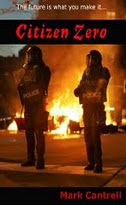The Cautionary Tale of Johann Hari
Be careful what you write; be careful how you write. If anything, the sorry saga of Johann Hari, the Independent journalist accused of plagiarism, provides a cautionary note to those of us who like to attempt a certain literary flair with our journalism.
By Mark Cantrell
MISTAKES happen.
When they do, we’re supposed to learn from them – if we can – but sometimes those errors creep in, settle down and make themselves at home. The longer the mistakes linger, the harder it is to evict them, and the uglier it gets when finally the squatter is spotted.
That brings us to Johann Hari, the writer and journalist for The Independent newspaper, who has found himself embroiled in a scandal over plagiarism. Here, we find an anecdote about the consequences of a basic unrecognised error, allowed to settle into standard – taken for granted – practice, where the consequences are all the messier when it is eventually revealed, as Hari has so recently discovered the deeply unpleasant way.
As someone regarded as being part of the cream of Left-leaning thinkers and writers in Britain, occupying a prime slot in national newspaper, his head, of course, is well and truly raised above the parapet. By the nature of his writing, he is a man who invites pot-shots from political enemies as part of his daily bread.
The furore that has enveloped him, courtesy of Twitter, last week goes far beyond pot-shots. Rather, he’s taken an entire fusillade aimed at taking off his head, in a sorry affair that his supporters have suggested is an artificially-inflated controversy stoked for political motives.
Perhaps that is so. Unfortunately for Hari, and for his supporters, he has not only given them the ammunition on this occasion, but ‘locked and loaded’ the assault rifles for his enemies. In short, he’s been caught out and taken to task over the content and integrity of his writing. The man has gaffed – and big style – over a period of time.
So, what’s the essence of this gaffe? Essentially, he’s been accused of plagiarism, passing other people’s work off as his own. He has denied this, and apologised for his mistakes. The issue is strangely complicated, so I shall partake of fair usage, and let Hari explain what he was trying to do in his own (duly attributed) words:
"When you interview a writer – especially but not only when English isn't their first language – they will sometimes make a point that sounds clear when you hear it, but turns out to be incomprehensible or confusing on the page," he wrote in an article in The Independent (29-6-2011). "In those instances, I have sometimes substituted a passage they have written or said more clearly elsewhere on the same subject for what they said to me, so the reader understands their point as clearly as possible."
He went on to say in the same article: "It depends on whether you prefer the intellectual accuracy of describing their ideas in their most considered words, or the reportorial accuracy of describing their ideas in the words they used on that particular afternoon. Since my interviews are long intellectual profiles, not ones where I'm trying to ferret out a scoop or exclusive, I have, in the past, prioritised the former. That was, on reflection, a mistake, because it wasn't clear to the reader."
When I read the accusations and, subsequently, Hari’s explanation, I understood what he was trying to achieve and appreciated his argument, but… Well, there’s always a ‘but’ and here it is all-important. Those quotes should have been attributed. That was my response. These were interviews, not essays, and should fairly reflect the encounter between interviewer and subject, but that doesn’t mean he is barred from including referenced quotes from the subject’s written works, or even – within the bounds of fair usage – quotes given in other publications (duly attributed, of course).
Hari was man enough to apologise for his mistake, at least, but I can’t help feeling he’s taking flak for some of his associates occupying oversight roles who also ought to make an apology, to Hari, as much as to his readers. The flaw in his technique really should have been picked up at a much earlier stage of his professional development and set right before it had the chance to fester into this messy controversy.
Instead, as is the danger with unrecognised errors, it has worked its way into his regular technique to become the ticking timebomb that has finally blown egg all over Hari’s face.
Unfortunately, Hari’s public recantation has not been enough for his critics. The controversy has stepped up, with Hari accused not just of polishing his set-piece interviews with quotes drawn from the subject’s previously published writings, but of also lifting quotes from newspaper and magazine articles, as if the subject had said them fresh to Hari. Now that, it must be said, is not so easy to pass off as anything other than plagiarism.
For myself, I have no reason to doubt Hari’s personal honesty and integrity. I don’t know the man on a personal basis, and never will, for we move in different geographical, professional and socio-economic avenues, but his writing I have admired and trusted. I can appreciate his efforts to achieve ‘intellectual accuracy above journalistic accuracy’, even though I do feel his method was erroneous. The two are not, after all, mutually exclusive.
Okay, so the ‘brand’ Hari is perhaps somewhat tarnished now, for this affair inevitably casts doubt on the provenance of his articles. That said, there is, I think, a world of difference between a well-meant and sincere gaffe and a wilful intention to deceive. For myself I am not convinced that Hari was attempting to be untruthful, but has instead got caught in a dreadful trap that is an inherent risk of the type of journalism he has made his name pursuing.
To put it simply, Hari is a man who combines his journalism, his reportage, with the creative flair of the writer, the intellectual insights of the essayist, and the first-person narrative that is the written word’s equivalent of the television presenter. In Hari, one can see the echoes of writers from an earlier age: I’m thinking of Truman Capote right now, but I can also envisage George Orwell, John Pilger, and others in the vein that Hari follows.
Journalism is an unforgiving mode of writing in and of itself, all the more so when combined with the literary forms mentioned above, but it doesn’t automatically lead to a fruitless hybrid. Provided the strictures of good reporting standards are maintained, these hybrid forms create some fine forms of journalistic expression. In cases, it breeds timeless pieces of literature that serve both the rapid-fire turnover of standard newspaper fare, whilst at the same time taking its place on the shelves of posterity as great writing and timeless tales of the human experience.
Where Hari went wrong, as his own admission suggests is that he became neglectful of the boundaries of the forms he sought to mix. Mistakes happen, as I said in the opening, but this is an error in Hari’s technique spotted woefully late. Those quotes he lifted and re-presented as fresh in his articles should have been cited. Written well, and there is no reason to doubt that Hari is anything less than a skilled writer, then such attributions of external sources should have cause no interruptions in the flow of his prose.
As an essay, those lifted quotes would have been cited, and would have been fair usage; such would not have been out of place in the long-form interviews that Hari has presented in the past, if that was his fear. As he said in his apology, the interview is essentially a report to the reader of his encounter and conversation with the subject of his interview. The crucial word there is report – reportage. But as an interview, it is not simply a news story, so there is scope to bring in secondary sources, citing what the interviewee said in a book, or – within limits – another publication. It can be done, with proper attribution, in ways that will make no detriment to the copy. In some cases, done well, it may even enhance the resulting article.
My reading of the Hari affair is that this is, in some respects, what the man was trying to achieve, but he has blown it by passing off the quotes as his own. A mistake, caught far too late, and so the controversy must now burn a conflagration through his professional standing. Quite what will be left in the wake of this is beyond my capacity to judge, fairly or otherwise, but for my part, I hope he comes through, wiser and stronger for the ordeal.
As a writer myself, albeit far from operating in Hari’s league, I find in the affair a timely heads up to ponder my own writing endeavours. This is very much a cautionary tale, for it focuses on technique and practice, and the necessity of keeping a careful eye on both, for it is easy to stray in to error.
In the wake of Hari’s trials and tribulations, I am left wondering about the mistakes and gaffes lurking within my own practice of writing and journalism, for like him I like to bring a certain literary flair to my journalism whenever I feel able. To what extent, I must wonder, have I stumbled? Hopefully, I haven’t – but Hari was blessedly ignorant of his gaffe until he found it suddenly lobbed in his face.
No matter who we are, or at what level we write, it’s always worth pausing to reflect on our craft, to critically examine our technique, our intentions, our accuracy. These are all essential ingredients to our honesty and integrity as writers, and innocent mistakes can be as devastating to its well-being as malice aforethought.
Readers are no fools. Treat them as such – whether by error or by disdain – then they will show us the fool that lurks within our words.
Mark Cantrell,
Stoke-on-Trent,
3 July 2011
Copyright © July 2011. All Rights Reserved.
LINKS: Further Reading
UPDATED (20-7-11): Johann Hari suspended from the Independent following plagiarism row Jason Deans and Jemima Kiss (Guardian, 12-7-2011)
Does Johann Hari actually meet his interviewees? Guy Walters, (New Statesmen 1-7-2011)
Orwell Prize launches investigation into Johann Hari (Press Gazette 30-6-2011)
We can't let Hari off the hook because he's "one of us" Steven Baxter (New Statesmen30-6-2011)
Johann Hari faces fresh plagiarism allegations Dan Sabbagh (The Guardian 29-6-2011)
Johann Hari: My journalism is at the centre of a storm. This is what I have learned (Independent 29-6-2011)
Category: COMMENT



























5 comments:
This is a very generous 'take' on the Hari situation, Mark, and I think it's nice to read something a little less abusive on the wayward soul. However, that said, it's surely stretching it a bit to suggest that Hari made a series of mistakes, no? What he in fact did was make a series of deceits, and probably committed plagiarism. I'm not sure one can say that one committed a series of mistakes, over many years, and think that one can have done with it. He's in a far trickier situation than that, I fear. I'm to the left of Hari and am no fan of his purely moral essays, but I do feel for him as an individual. I just cannot see how he get come out of all this looking well, though. You?
Thanks for the comment. Given the additional allegations about Hari's work, you might be right about my article being somewhat generous, but my thoughts were largely centred around his initial apology and his explanation of what he was trying to do.
Though I can appreciate what he claimed he was atempting to do, my initial reaction was 'you've cocked up there, Hari'. He was wrong. Plain, stupidly wrong, but it caused me some pause for thought about my own work and the potential for stupid innocent errors to creep in and become part of everyday routine.
Hari's error might not be so innocent as my article suggests, of course, especially given the allegations that followed his apology, but then I was writing around a rather narrow 'window' in the timeline of this affair.
Your point about deceit is a valid one. Even if Hari's actions were innocent in their intent, he is still misleading his readers and it does call into question the veracity of his work.
I have no idea what will happen to Hari, but it certainly doesn't look good for him at present. Alas, he only has himself to blame.
Hi Mark
Yes, I agree with much of what you write, and fully appreciate the window of opportunity you had for the article, etc. That said, I still don't reckon that "his actions were innocent in their intent". By now, with all the evidence of stolen quotes, across genres and indeed over many years, that one seems a little bit *too* generous.
For the life of me, you know, I cannot fathom how or why he thought he would get away with it. With the advent of the Internet, it was surely only a matter of time before the pack of cards collapsed, i.e. the uncovering of one apparent 'mistake' leading to people simply pasting Hari's phrases into google and seeing what they come up with. As we now know, this has been done, and all manner of similar 'mistakes' have been laid bare.
As you note, Lord knows how he's going to get out of this one. I, for one, now seriously question anything and everything he's ever written. For example, did he *really* have sex with both a neo-Nazi and an Islamic fundamentalist? It always seemed rather fanciful and journalistically fortuitous. But, right now, it also seems to me downright unlikely in the extreme. What a waste of talent, eh?
Yes, I've been reading more on this sorry saga since I wrote the article, and I have to say my generosity towards Hari cartainly looks misplaced in light of what I have read.
It's a shame. I came to Hari's writing late in his career, and appreciated much of his work that I have actually read -- even if I didn't agree with some of his opinions -- but now, well... frankly I am baffled by it all.
The man strikes me as a talented writer. I am presuming he has -- or at least had -- the ability to thrive as a journalist, so I cannot understand why he felt the need to resort to such dodgy practices. And indeed, expect to get away with it.
If I were a man in Hari's position, writing for a national newspaper, given carte blanche to indulge myself on subject matter as well as my literary and intellectual pretensions, and knowing damn well that I am going to draw flak on what I write, I wouldn't dare take such a cavalier and deceitful approach.
You're right, it is a sad waste of talent.
Well, here's the latest and an apology: http://www.independent.co.uk/opinion/commentators/johann-hari/johann-hari-a-personal-apology-2354679.html
Post a Comment